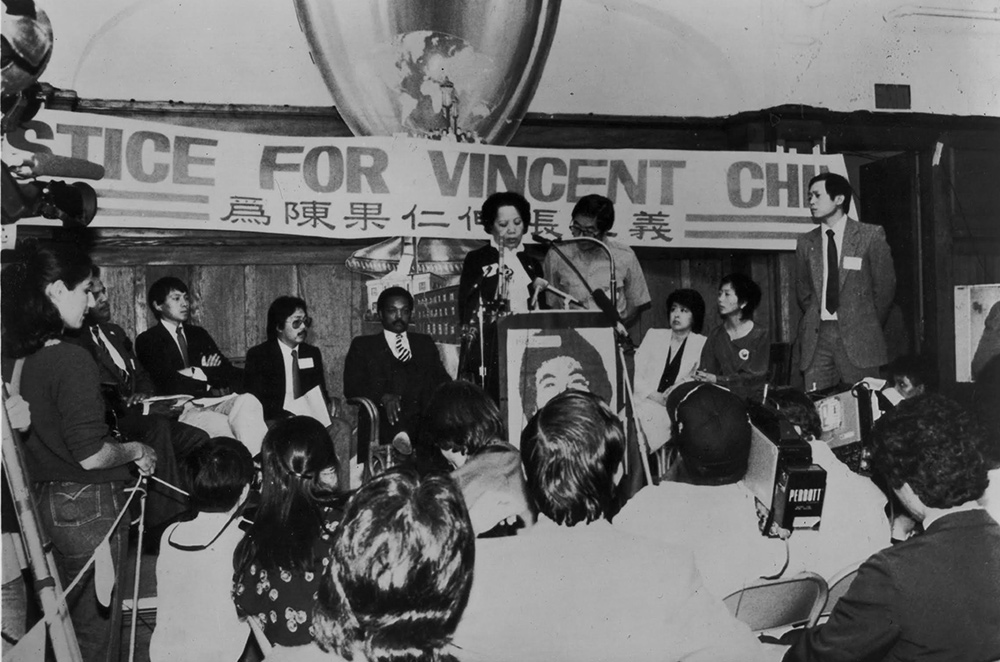I hate that the Oscars have moved to February just like I hate that George Washington’s birthday is no longer a separate holiday. But that’s not real hate. Real hate is murderous. The 61st Academy Awards ceremony was held on March 29, 1989 at the Beverly Hills Hotel. “Rain Man” won four Oscars. On my birthday this year, February 22, a murder occurred that reminded me of one of the films that lost at the 1989 Oscars: “Who Killed Vincent Chin?”
“Who Killed Vincent Chin?” was one of five documentaries nominated and lost to Marcel Ophüls’ “Hôtel Terminus: The Life and Times of Klaus Barbie.” If “Who Killed Vincent Chin?” had won, there is no guarantee that the documentary or the subject of the documentary would be better remembered.
Christine Choy and Renee Tajima’s film was about a Chinese American man who went out to a strip club as part of his bachelor party on June 19, 1982 and ended up dead four days later. On that particular summer night, Vincent Chin, a 27-year-old man, was severely beaten by two unemployed autoworkers. The murderers, Chrysler plant superintendent Ronald Ebens and his stepson Michael Nitz, thought that Chin was Japanese American. They beat Chin with a baseball bat. Nitz held Chin while Ebens bashed Chin’s head in. Chin, whose adoptive father had fought in World War II, died four days later.
Through a plea bargain, Ebens and Nitz pled guilty to third-degree manslaughter and received a fine and three years probation. They had originally been charged with second-degree murder which is an intentional killing that is not planned. As a felony, second-degree murder would not have allowed probation.
To be fair, Chin had provoked his attackers, challenging them to what he had perhaps thought would be a fist fight, but changed his mind when Ebens brought out a Jackie Robinson model Louisville Slugger bat. Chin and his friends ran. Ebens then searched for Chin, finding him at a McDonald’s. With Nitz’s help, Ebens cracked Chin’s skull.
The case sent a shock of outrage in the Asian American community. Did Asian American lives not matter? The US wasn’t at war with Japan, except in the economic sense. Chrysler and other US automakers had ties with Japan and also were outsourcing to Canada and Mexico. Chrysler was repackaging Mitsubishi models and selling them under its Dodge and Plymouth brands. Yet Japan and the Japanese and anyone who looked Japanese were being targeted. In the 1980s, East Asian Americans had to be wary of being in Detroit. It was a no-go zone.
On February 22, 2017, another Asian man was killed. Srinivas Kuchibhotla, 32, was shot and killed by a man, Adam W. Purinton. Purinton allegedly shot at two men at a family restaurant. He reportedly had yelled, “Get out of my country” at two Asian Indian men before being asked to leave by Ian Grillot. Purinton left but returned with a gun, shooting Kuchibhotla and his friend Alok Madasani, 32. Grillot, 24, didn’t know the two Indian natives, but was shot when he followed Purinton on to the street.
The fear in one segment of the US population is that the Indian men were targeted because they were mistaken for Muslims. According to the Washington Post, the shooter thought the two Indian nationals were Iranian. Yet the hate might be wider than that. In 2014, a man with a history of anti-Semitic views, Frazier Glenn Cross, killed three people at a Jewish community center in Kansas. The three people he did kill—William Lewis Corporon, 69; Corporon’s grandson Reat Griffin Underwood, 14; and Terri LaManno, 53—were not Jewish. Cross pled not guilty because according to a CNN report “he claimed he was protecting the white race from Jews” and while he admitted to the killings, he “wanted to kill Jews, not people.” Cross was convicted of capital murder.
Purinton may or may not be a white supremacist and perhaps he felt like killing all foreigners. A white man, Grillot, was gracious enough to stand up for these two men who he didn’t know.
Our current president has not made a statement about these the attack on the Asian Indian men, engineers who had come to work for Garmin. He also did not make a statement about the 75th anniversary of Executive Order 9066.
In his first address to a Joint Session in Congress, on February 28, Trump commented, “While we may be a nation divided on policies, we are a country that stands united in condemning hate and evil in all its forms.” That’s six days later and doesn’t address this and other acts specifically.

Vincent Chin has largely been forgotten, enough so that Curtis Chin (not related to Vincent) wrote and produced a documentary called “Vincent Who?” in 2009. Vincent Chin had largely been forgotten by that time even in the Asian American community.
Yet the questions that both documentaries ask remains the same: When will Asian Americans be considered American enough and when will Asians matter in the racial conundrum that is the United States? Last year, a New York Times journalist started a conversation #ThisIs2016. The Indian men who were targeted in 2017 are Asian and they could be considered black. This is not only a #BlackLivesMatter but a question about Asians and Asian Americans as well. Muslims are predominately from Asia, but then, Christianity is also a religion founded in West Asia.
Last year’s Oscar ceremony failed Asians and Asian Americans (and Latinos) even as it addressed #OscarsSoWhite. Diversity matters and Asians and Muslims should be part of any diversity conversation as well. This year’s Oscars wasn’t so white, and seems more determined to deal with racial and religious prejudice than our current president. Hate isn’t just black and white, nor is it only to be criticized when it targets Jews or Christians. And if you need a reason to reach across labels, remember that Vincent Chin and Srinivas Kuchibhotla died because of mistaken racial identity. Don’t wait until the hate targets you.












